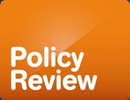In the “New Turkey,” there is only one leader—Recep Tayyip Erdoğan—and trying to pretend otherwise leads to dismissal. In just six days, from May 19 to 25, the Turkish president ushered in a compliant prime minister, Binali Yıldırım. Gone are all appearances of a parliamentary regime, as prescribed by the current constitution: the new prime minister declared that aligning the constitution with Turkey’s de facto presidential regime was his utmost priority.
For her part, when meeting Erdoğan in Istanbul on May 23, Merkel, under heavy criticism at home and in the European Parliament, criticized the lifting of parliamentary immunity for lawmakers suspected of abetting terrorism.
She also repeated EU demands for Turkey to amend itsantiterrorism legislation. Although this criterion is nothing new—it has been on the table since 2013—the Turkish president has said again that he will not amend the legislation for the sake of achieving a visa-free regime for Turkish citizens traveling to EU countries. The very principle of meeting this condition is now challenged, which may derail the entire refugee deal.
Erdoğan’s intransigence is rooted in his quest for absolute power. The pro-Kurdish Peoples’ Democratic Party (HDP) emerged as the third-largest force in the Turkish parliament in both the June 7 and November 1, 2015, elections and is the main obstacle to the president’s march toward total supremacy. Having already dropped the peace process he had launched with Turkey’s Kurds, the president is fighting a strong insurgency from the Kurdistan Workers’ Party (PKK). The next step is to make the pro-Kurdish party fall under the 10 percent threshold required to send deputies to the parliament. Their parliamentary immunity having just been lifted, a number of HDP deputies could be prohibited from running in a future election. But neither the lifting of the parliamentarians’ immunity nor their potential prohibition is compatible with EU standards.
As for the EU-Turkey refugee deal, the German chancellor stands no chance of convincing the European Parliament and the European Council to mellow the conditionality regarding the antiterrorism law. More generally, it has become politically impossible to endlessly bow to Ankara’s strident blasts, especially as the rule of law and freedom of expression in Turkey keep deteriorating. Former Turkish prime minister Ahmet Davutoğlu’s fervent proclamations toward the EU always sounded like virtual reality, and repeating the same narrative won’t be convincing any longer.
Moreover, on June 2, the German Bundestag will discuss a resolution regarding the 1915 Armenian genocide, a debate Merkel cannot thwart. This will send Turkey into frantic protests, adding another reason for Ankara to challenge the refugee deal.
Conversely, Ankara’s threat to send cohorts of Syrian migrants to the EU is not a viable option, as it would run counter to Turkey’s much-proclaimed compassion for refugees. Similarly, the bluff to call off the EU-Turkey Customs Union would badly hurt Turkey, not the EU. But, typically, Ankara’s nationalist narrative would be well served by a string of harsh moves against the EU.
In today’s Turkey, the president’s march toward total power is unstoppable. Soon, a snap legislative election is likely to result in a three-party parliament (without the Kurds), in which the ruling Justice and Development Party (AKP) will hold an overwhelming majority, leading the way to a new constitution. Introducing a radical change in the country’s political landscape is the Turkish president’s foremost priority.
The main protagonists of the refugee deal are now locked into their respective domestic constraints. Hard choices, not pretences, lie ahead.
Erdoğan is reaching absolute power. He doesn’t need Europe anymore for this. On the contrary, EU standards have become a roadblock, as his political supremacy hinges on absolute firmness on the Kurdish issue, antiterrorism measures, freedom of expression, and the rule of law. It is time for EU leaders to realize that these political goals cannot be attained in an EU-style environment with critics and checks and balances, and that Ankara’s EU narrative has become inconsistent with current Turkish politics.
EU leaders including the German chancellor need to prolong the refugee deal with Turkey. However illegal and immoral the deal is by EU standards, they have agreed to pay that price. They should say that the huge fund foreseen for Turkey in the deal should be used faster—but only on Turkish soil, so as not to serve Turkey’s own policy in Syria. Beyond that, EU leaders need to withstand Ankara’s emotional narrative, wait for Turkey to fulfill all the criteria on visa liberalization (if ever), and postpone the country’s EU accession negotiations until better times.
If they compromise further EU core principles, EU leaders will not only suffer more vexing words from Ankara but will also have offered the European extreme right a huge bonanza. Merkel, France’s François Hollande, the UK’s David Cameron, the Netherlands’ Mark Rutte, Belgium’s Charles Michel, and others had better look twice at political trends at home before bowing once again to Recep Tayyip Erdoğan. In the EU, like in Turkey, all politics are local.
Marc Pierini is a visiting scholar at Carnegie Europe. This article was first published by Judy Dempsey’s ‘Strategic Europe’. Which is published under the aegis of Carnegie Europe. More infornation can be found at www.carnegieeurope.eu


